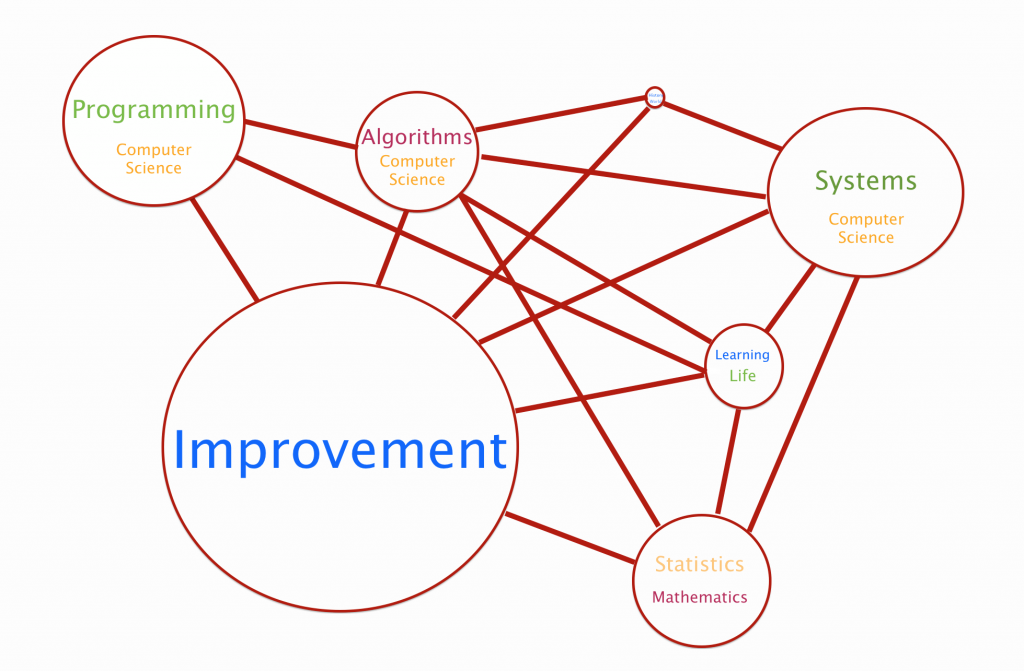Thou art god, I am god. All that groks is god.
– Robert A. Heinlein, Stranger in a Strange Land
Today, on my drive home from work I was listening to the audio lecture series TTC: How We Learn for a second time. The first time I listened to it was about two years ago and I figured the lectures would peek my interest enough that I would do some research on the subject (I have written about learning efficiently through audio books here!). The particular lecture I was listening to today was regarding story telling and how it influences how we learn and frames our mindset.
Cultural Identity
You are what your parents made you.
As with most basic human activities, story telling is largely taught by our parents. It turns out when comparing across cultures, Chinese children and American children will each focus or embellish on different aspects of the story [1]. Chinese children will share stories in a interdependent and more group conscious way, and in contrast American children will tell a story in a more independent “look what I have overcome” manner.
If we then look at what the parents “rewarded” by praising the children, we will notice that the rewards match with what the children expressed, leading to the conclusion that the children framed their story telling around the parents praise. Further, since many children search for recognition/praise from their parents, they will attempt to replicate their parents values. Internalizing their parents values, attempting to reproduce those values in both stories and daily life.
By the time a child reaches schooling age (in the U.S. or China) the majority of children also share similar cultural story telling methods. Reinforcing cultural values their parents taught them prior to five or six years old, and ensuring the cultural identity for generations to come!
Learning Through Listening to Stories
It turns out that often times lectures can be useful (who knew). When a teacher or any lecturer explains information in a dry way you’ll lose interest. Who want’s to listen to someone literally read code (in a C.S. course) or dates (in a history course) off a power point? No one. However, if you have an engaging lecturer who spends their time going through how or why they learned this information or giving you an engaging/humorous story you are much more likely to remember the lecture [2][3]. Try the following thought experiment:
Try to remember a funny story that was told to you by a friend, then try to remember a specific point in a recent dull lecture/seminar/meeting you have attended.
Although some of you may remember a point or two (or perhaps more), often it is much harder to remember any particular points from a dull presentation of information. Yet, you can quickly recall laughing. One personal experience I have with this was my very eccentric 8th grade history teacher. She would spend every day ranting about all of these forgotten laws, yet I remember most of what she said because she presented them in a unique format (that is, she acted absolutely insane).
Moreover by presenting information in a story form, the teacher/lecturer is cuing the listeners/learners in that “this information has application.” One of the big downfalls of the public education systems is maintaining students interest. By engaging students through story telling it is possible to teach critical thinking skills (i.e. abstracting information), provide motivation to learn, and help students learn better because they can more easily recall a story than list of facts.
How Storytelling Influences Learning
On the other side of the spectrum telling stories also supports learning. In fact, telling a story is such an effective study tool I use it regularly to study for exams. Have you ever heard the phrase:
If you can’t teach it, you don’t know it.
By understanding a subject well enough to explain it to others, you first must have encoded it in long term memory. Further, by teaching others you are re-encoding the information, ensuring you will remember it better, longer and perhaps increase memory capacity (or at least recall)[4].
Even more importantly, by attempting to teach a subject using metaphors and stories ensures that the information is being connected to other memories. Enabling you to recall this information via various references. Take for example this blog, I intentionally categorize each blog post and link back to my previous webpages to create a “web” in my brain of how the various subjects interact. Visually, this looks something like this (taken from a previous post about learning through blogging):
In a sense, my goal in writing this blog post is to connect you and your memories to my blog post, enabling you to remember and use the information on this page. The ironic part, is me telling you this has likely helped you remember it, I have engaged you personally and connected you to the story I am weaving [5]. Leading me to my final point…
Telling Stories Together
Even more important than listening or telling a story is doing both together. By sharing stories we do three key things:
- Sharing stories brings a group closer by sharing a vision and understanding [6].
- Providing feed back to either support or disapprove of actions [7].
- By interacting with our knowledge (i.e. sharing stories or information) we can gain insight into what we do not know or fully understand. This is called a feedback loop and it can provide us insight on where to focus our learning [8].
Focusing on #3, learning material on your own is common and can be very effective. However, many students in college learn very quickly that groups can aid in learning material much faster if the group is focused (meaning they are attempting to learn). By providing feedback to one another, figuring out when you make a mistake faster and sharing metaphors/insights it is possible to obtain as well as re-encode information much more quickly.
My personal experience, which I believe effective consist of the following:
- Read material and google until I find an article which explains the topic in jargon I understand (wiki’s on math are often stupidly unreadable). Providing me with a quick basis of understanding, and I take notes here or there; writing helps you re-encode the information.
- Listen to any lectures at 120 – 250% speed, this depends on how quickly the professor speaks, but it turns out we can understand people even though they speak quickly. No notes in this stage.
- Attempt to write a blog post or essay on the subject. If I can write a high quality blog post I understand it, if not I do research (sometimes for several days) until I understand the subject.
- Post a blog article and my usual readers will often respond, take considerations, reflect, and respond either defending my position or admitting a mistake and correcting my post.
- Submit blog post on Reddit and brave the hail storm of criticism, potentially arguing or correcting mistakes in learning.
Throughout this process I am either retelling the story, engaging in another persons story or both. By forcing myself to re-encode the information over and over again I gain insight to my faults, as well as connect the topic of my blog post to topics others believe relevant. In other words, I am performing story telling with an audience I will never meet, but are often highly engaging, and can span the world.
I recommend others perform similar methods and if you do feel free to message me. I would love to participate in discussions on interesting subject and provide feed back to help you learn as well!
Another Useful Guide
Using Storytelling to Enhance Learning (Research Paper) – This paper is a bit dated, but it goes into detail about how to use story telling as an effective method of learning (similar to this post) and how to create “story telling culture.”
Related Articles
Are College Degrees Worth the Cost?
Are Decisions Governed by Free Will or Algorithms
Bilingualism and Pattern Recognition
Please Excuse My Grammar
Introduction to Linear Regression





From the time I was very little, my dad told us stories before bed. He made up stories about inanimate objects that came to life (like the box of Kleenexes that was sad because no one used them, so they sang a song). He told stories from his childhood, most involving the animals on their farm. It is, without doubt, my favorite childhood memory, and I hope to convince my husband to do this for our future kids!
As a college student, one of the most meaningful times I had with my friends was when we went to Shari’s very late at night, last-minute. A fairly large group of us. Probably 10 of us squished around a corner booth. Someone shared some instance of their life, and we were enraptured – then I suggested we each share some memorable story from our lives.
Some of them were so funny we were crying. Some were of frightening or near-death experiences; some were meaningful or spiritual. Each person, while telling his story, had the floor; everyone else listened and applauded afterward. It was such a good relationship-building experience! And yes, I remember the stories – at least, most of them! I remember well which story I told – and if I hadn’t told it then, then I wouldn’t remember it now.